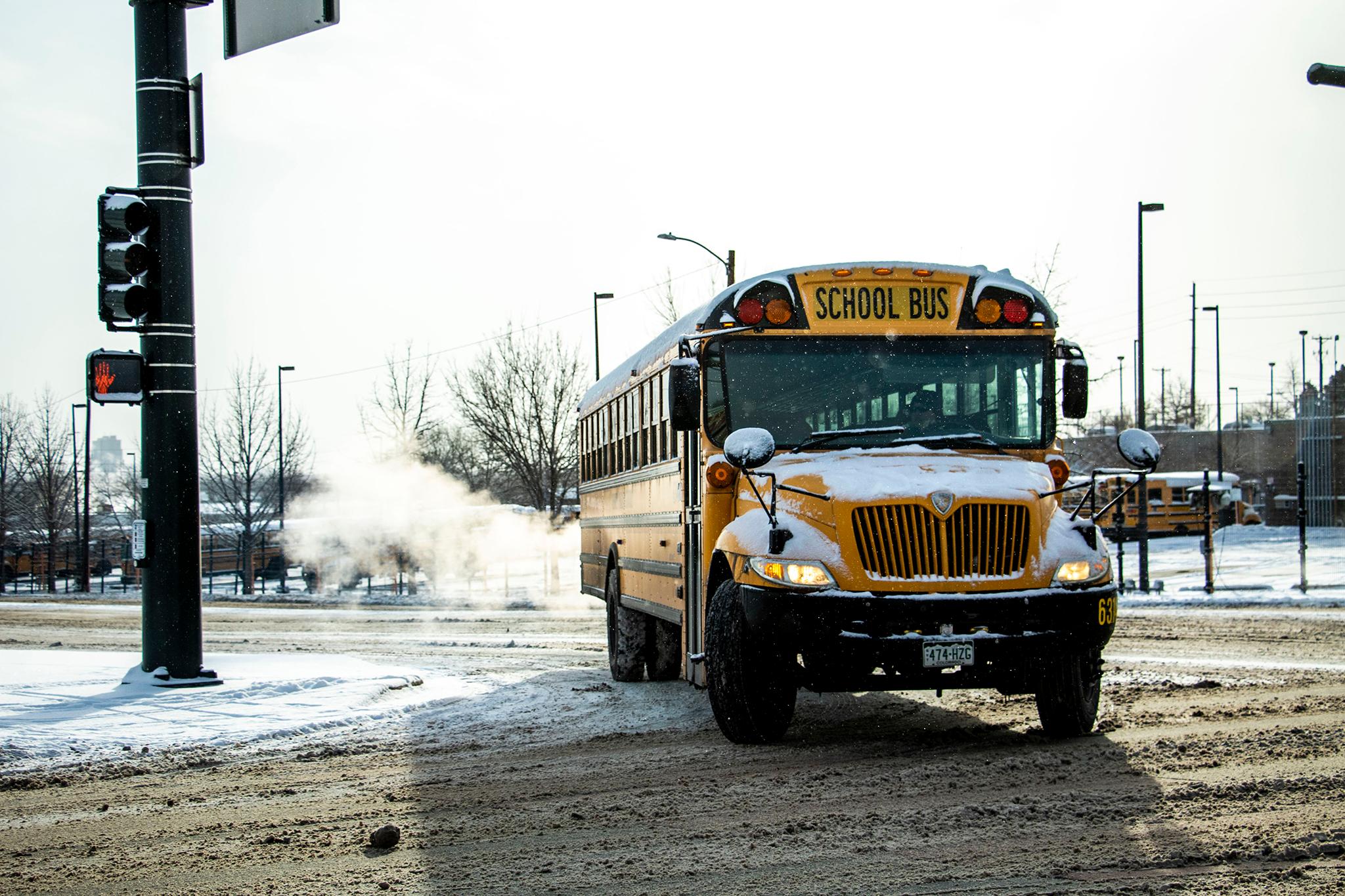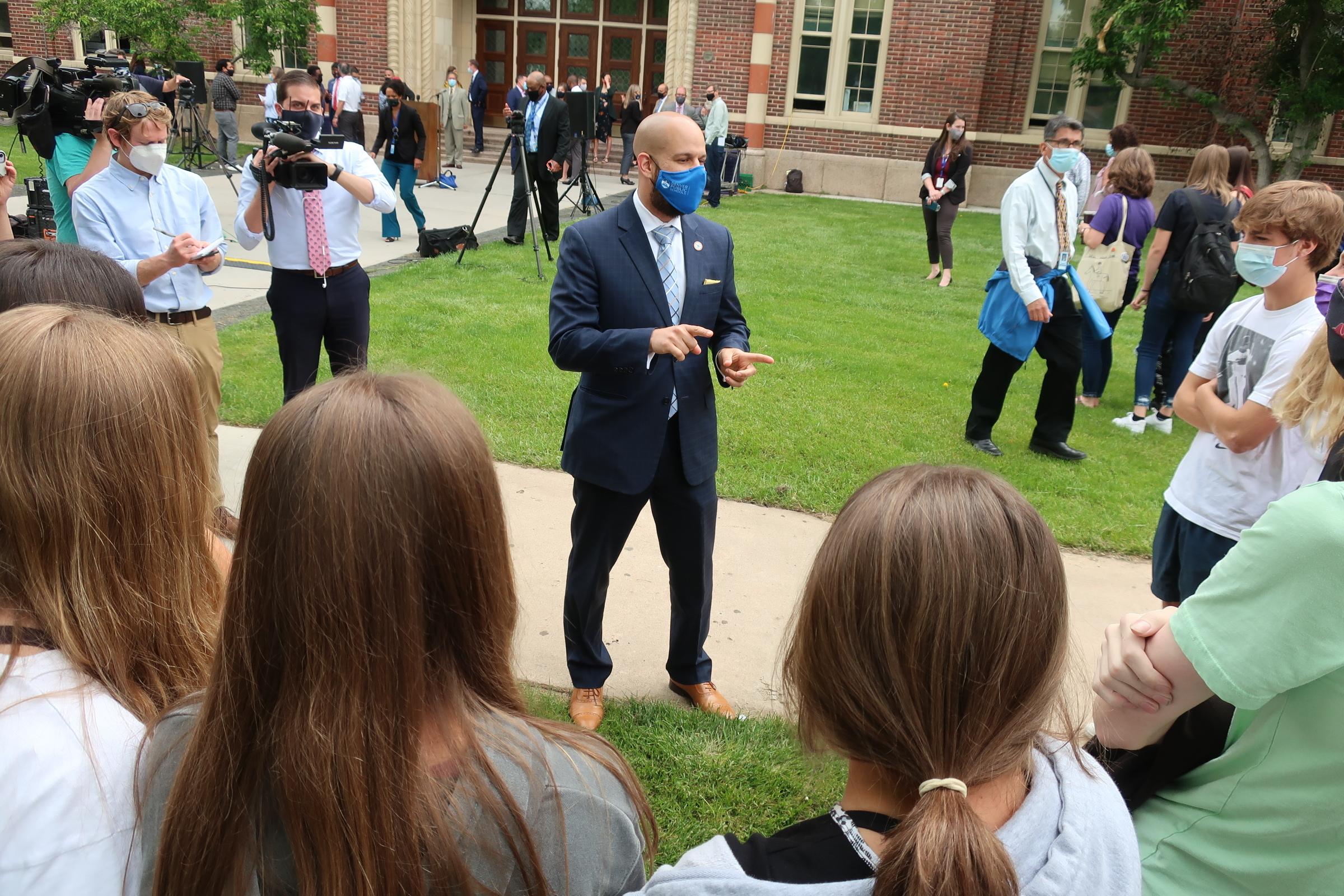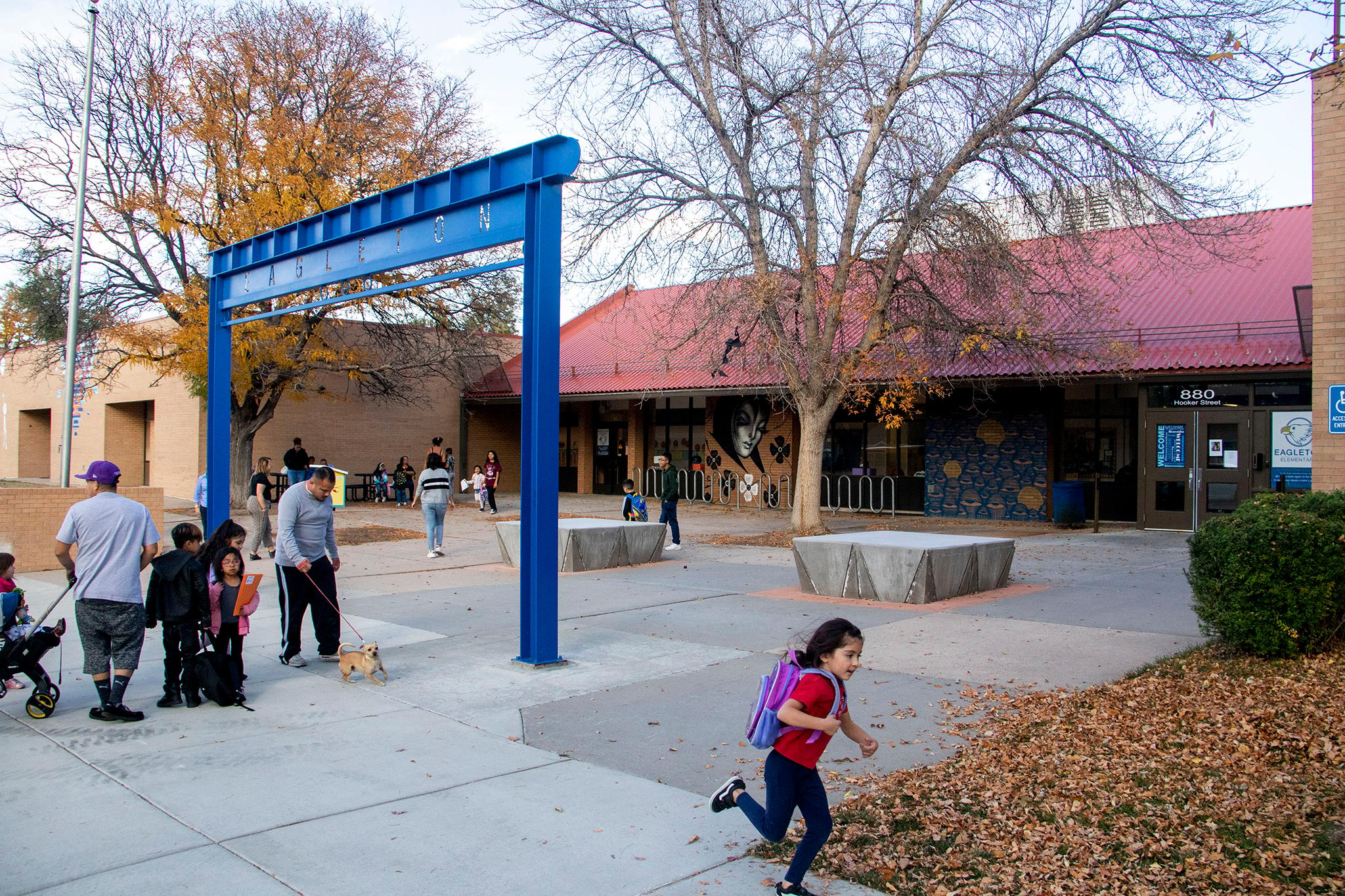It's been a tumultuous few years for Manuel Aragon's daughter Nayeli. She had multiple kindergarten teachers when she started school a few years ago, then there was the teacher strike in 2019 and the pandemic a year later. Fourth grade was finally starting to feel like normal, until Tuesday, when Denver Public Schools (DPS) sent out a list of 10 elementary and middle schools recommended for closure, or "unification" with neighboring schools.
Nayeli's school, Colfax Elementary, was on that list, along with many other schools that predominantly enroll students of color and students who receive free and reduced lunch. Most of the schools are in south, west and central Denver.
"For us, it is this dilemma as parents as our daughter's rebuilding and watching her own friend group and social structures rebuild, that it's just gonna get devastated again," Aragon said. "I think she felt really upset that, here's another thing, here's another obstacle, and that these friends that she has who she feels really close with, they may not be together for much longer."
DPS first released a plan to close 19 elementary schools due to low enrollment a year ago but paused that plan over community concerns and the state of the pandemic. But now the recommendation to close smaller schools with low and dwindling enrollment numbers is back on the table.
The school board is voting on the recommendations on Nov. 17, though the earliest schools would close would be the 2023-2024 school year.
Multiple parents had one word for the recommendations: "devastating."
Many parents and advocates worried about how the recommended closures will affect students experiencing homelessness.
Aragon said that community schools like Colfax provide resources beyond the school day, especially in marginalized communities.
"We've had schools fill the gaps in society, whether that's mental health or just health or nutrition and food, and a number of families get those things through Colfax," he said. "How will they be impacted when we move their school a mile down the road?"
Shantelle Mulliniks has two kids at Colfax Elementary this year and others who are graduates. She's been a parent of students at Colfax for the past 10 years.
"It's been devastating, I definitely didn't sleep much last night," Mulliniks said.
She's particularly worried about students who come to Colfax from The Volunteers of America Family Motel, which houses people experiencing homelessness for up to two weeks. The school is only a couple blocks from the Motel, but the one students staying there would attend after school unifications are done is about a mile away.
"These families, many of them would describe it as the worst time of their life and to have that stability for the kids a few blocks away, to have these kids be able to come to the school day there and to have a staff that's incredibly capable and trauma-informed and able to support these kids during a really difficult time in their life is super important," Mulliniks said.
Superintendent Alex Marrero said Colfax was at the top of the original list of 19 schools last year. He said that students staying in the Motel will have access to transportation, and that Cheltenham Elementary is not too far away.
"I'm not surprised that Colfax was part of the output because it's really struggling in terms of enrollment," Marrero said.

Transportation is a big issue too-not only for students experiencing homelessness, but for everyone.
While many of the closed schools would combine with the closest school nearby, the closures still mean that students would have to travel farther to get to school. And with many lower income families affected, lots of students don't necessarily have access to cars. Plus, DPS has already had trouble getting kids to school due to a bus driver shortage.
Marrero emphasized that kids will have transportation, but recognized that it's been a challenge for the district.
"Transportation is always going to be offered," he said. "It's easier said than done because we are experiencing some shortcomings in terms of human capital in terms of resources there."
Mandy Nunes Hennessey has a daughter who attends Columbine Elementary, which is set to receive students from International Academy of Denver at Harrington under the current recommendations. She helped found Mamas de DPS, a group of Latino parents in the school system, and said that in Southwest Denver in particular, many families don't have their own transportation to school.
Nunes Hennessey added that proximity to school isn't just about how easy it is to get there -- it's about community. She says this is undermined by the new recommendations and the school choice system, which lets students attend schools outside their zone.
"We all love the idea of walking our kid down the street to a school, and we love the idea of our kids playing with kids that they go to school with," she said. "It's a breakdown of community."

Advocates also worry about resources for Spanish-speaking students and the closures' effect on Denver's Latino community.
"DPS talks a really great game of equity, but at the end of the day, Black and brown students and teachers are disproportionately impacted by these closures.... everything that I've heard from the people that we've organized with and the moms is just that they're devastated," Nunes Hennessey said.
Milo Marquez, chair of the Latino Education Coalition, was a third generation DPS student. He's been involved in conversations with the district about closures in recent months, so he wasn't particularly surprised by the recommendations. But he's worried about what comes next, and wants to make sure that students get sufficient transportation and multilingual education.
"When you close the schools down, then they don't have that program," said Marquez. "Where do these kids get that program? We're hoping that DPS continues to support these students, and they are absorbed or unified with another school that will offer that transitional language instruction program in their school."
The guidelines developed around choosing which schools to close included "equity guardrails," which sought to take into account special programs and services provided when choosing which schools to close. A district FAQ document about declining enrollment says that DPS will stay committed to "legal obligations" and moral duties to provide multilingual education, as well as special education and other programs.
"If any schools are closed or consolidated, close attention will be given to ensuring there are strong language programs for our students," the district states in the FAQ.
Mulliniks, one of the Colfax Elementary parents, also worries about the effect on Spanish speakers at her school, especially given how gentrification has changed the area in recent years.
"It's like this core base of our community is being uprooted, and yet we still have this school that we call home, and it feels like home, and these teachers and staff, they take care of our kids, and our kids take care of each other, and our families take care of each other," she said.

While many involved in the DPS community anticipated closures coming after the first attempt in 2021, parents and advocates remain frustrated by what they consider a lack of community engagement.
"It feels like there's higher ups in DPS that have made decisions about a school community without actually involving that community," Mulliniks said.
Nunes Hennessey said that she and fellow parents with Mamas de DPS were trying to raise awareness of potential closures last spring, but concern was not high because no specific closures had not been announced yet.
"It was really about trying to organize our community and elevate their voices because so often they are missed in these conversations," she said. "The fact that DPS has not had really any community engagement process around these, and they're doing it after the fact... it's sort of shocking."
The Superintendent disagreed. "This has been a community-driven process since last year," Marrero said. "This is very different than what other districts have been doing, and this is very different than what DPS has done in the past."
Marrero pointed to community feedback sessions and the Declining Enrollment Advisory Committee, which worked to determine the criteria for closing schools. "That was an intense community partnership that cannot be negated," he said. "This is a long time coming... in response to something that would have happened last year, if I didn't make the right decision to pause it and engage the community the way that we have this time around."
For parents like Aragon, it didn't feel that different. Like Nunes Hennessey, he also called the announcement "shocking." "Aside from the declining enrollment committee, there hasn't been much community engagement," he said. "It can be disenfranchising to see DPS kind of doing business as usual and going with the same process that they've done during a number of other school closures."
Following Tuesday's announcement, DPS is holding a public comment session on Monday, Nov. 14. The board is voting on the list of recommended schools three days later, on Thursday Nov. 17.
The district has pointed to declining birth rates and enrollment numbers as the reasoning behind the closures, but some feel it did not have to be this way.
DPS looked at schools with fewer than 215 students, those with 275 students whose population was forecasted to decline 8 to 10% in the next two years and financially insolvent charter schools as candidates for closure, though no charter schools made the list. DPS also considered the list of equity guidelines when looking at schools.
Between 2019 and 2021, DPS lost 3 percent of its student body, or 3,600 students, and expects to lose 3,000 more in the next four years, costing the district approximately $36 million annually. As enrollment declines, the district says smaller schools cost more per student.
The top answers many people give as to why enrollment is declining are gentrification and unaffordability, with families priced out and young professionals without kids moving in. But many feel charter schools are also to blame for the enrollment issues.
Chalkbeat found that over the past 20 years, the district added schools faster than students, including many charter schools, a policy decision by past school boards and superintendents. Charter schools are controversial- some view them as an important alternative to traditional schooling, while others worry about using public funds for schools run independently from the district.
"You lessen bargaining, and you lessen accountability, so it is another iteration of really breaking down public education as we know it," said Julie Banuelos, former DPS teacher who ran for DPS School Board in 2017 and Denver Board of Education in 2019. She worries about the effect of closures not just on teachers, but other school staff like cafeteria workers, and feels like DPS didn't listen to the community.
In addition to charter schools, DPS has enrollment zones and school choice systems, which give families more flexibility beyond their closest neighborhood school.
"The idea that we just kept opening more and more schools, this very moment was bound to happen," said Nunes Hennessey, who advocates with Mamas de DPS. "I feel like there is a responsibility on the part of the district to say we messed up and to and to take some accountability for that."
Marrero, who was appointed in 2021, recognized that charter schools have been part of the problem.
"I know that some people may consider that controversial, but it is one of the factors," he said. "We're not here to judge on whether that was the right thing to do or not. What I can say is that I think that the expansion happened at a pace that quite frankly, outpaced and it was not in line with the community enrollment."
Some remain skeptical about how long low enrollment will last, given how much building Denver is doing right now. But Marrero said that the district's forecasters continue to project a decline in enrollment, despite the growth in housing. If that ends up changing, he said none of the schools receiving new students are at capacity, and many will still have room to grow.
"To make sure that we're not in a situation that we've made a mistake, we're not selling any of our property," Marrero said. "In worst case scenario, if we have to recalibrate, because we have to right size the district because we're expanding, first of all, we're welcome that, and we'll be in the ability to do so."
This article has been updated with Mandy Nunes Hennessey's full name.













